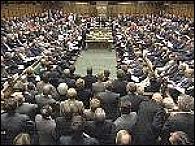2007年VOA标准英语-British Parliament Report Finds Racial Bias in(在线收听)
London
21 June 2007
The perception that young black Britons are more likely to get involved in crime is being countered by a recently released report that details racial profiling and discrimination in the British legal system. Tendai Maphosa reports for VOA from London that there is hope the report could help authorities address crime in the British black community.
The parliament committee report says records show a disproportionate representation of young black people at all stages of the criminal justice system. It notes that black children constitute less than three percent of Britain's population aged 10 to 17, but represent nearly nine percent of that age group arrested in England and Wales.

British Parliament
The report says black children are more likely to be stopped and searched by the police, less likely to be given unconditional bail and more likely to be remanded in custody than white young offenders. Young black people and those of 'mixed' ethnicity are likely to receive more punitive sentences than young white people.
The report also points to evidence that supports allegations of direct or indirect discrimination in policing and the youth justice system.
A spokesman for the government-funded Commission for Racial Equality, Nick Johnson, said there is, what he called, an in-built racial bias in the system. He added that the current Tony Blair-led government had made some very slow progress in trying to address the issue, describing its efforts as 'trying to stick plaster on it'. He said the report is a wake-up call for government to seriously deal with the issue.
"This report brings everything together in one place for the first time," Johnson said. "Also we are about to have a change of prime minister and a new focus in government that provides a real window of opportunity for issues like this to be looked at in a different way and this report's timing then could not be better because it is sitting there waiting for a new home secretary to pick it up when they come in next week."
Uanu Seshmi is a co-founder of the From Boyhood to Manhood Foundation, an organization that offers support to young black boys excluded from school and involved with gangs, drugs and violence.
Seshmi agrees with the report that there is a crisis, but also sees it as a turning point. He says he is relieved the report confirms what the black community always knew; that blacks face discrimination in the justice system.
"They choose to ignore black people, they say we are trouble makers and we are just making excuses, but now that parliament and some of those good people have discovered that what we are talking about is true, I have to say let us move on from here," Seshmi said.
Seshmi bemoaned the fact that according to the report three in four young black men would soon be on the national DNA database, while white criminals are less likely to be on the database.
The report mentions issues such as social exclusion, poverty, educational under-achievement, a lack of role models and the lack of a father figure in most female-headed families as contributing to the problem.
But Marvin Osemwegie a 20-year-old who was kicked out of school and ended up at the From Boyhood to Manhood Foundation project said he felt being marginalized in a white society is more a problem than the lack of a father in the family.
"A lack of role models is definitely a big issue," Osemwegie said. "But let us not get confused, there is a lot of fatherless kids out there that are doing well for themselves; likewise there are a lot of kids with fathers, my father was always there, but I still messed about so it is an issue but it is not a major issue."
Osemwigie, who is now in college, said while he feels that he may not have the same opportunity as white youngsters with the same qualifications, he refuses to be a victim and if need be he will create his own opportunities.